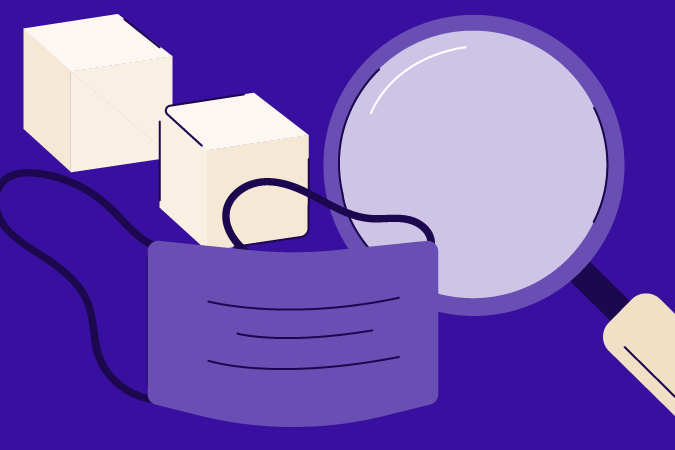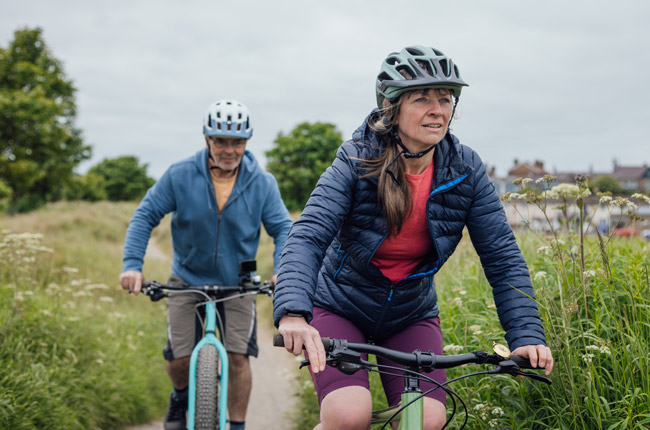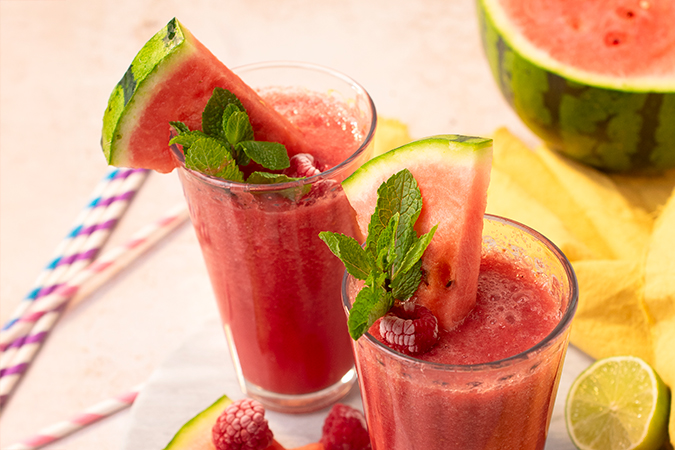Myths and controversies about what causes cancer
What really causes cancer? Find out more about the public’s opinion and learn about some of the myths and rumours, with information on breast implants, cling film and cattle hormones.

On this page
What does the public think causes cancer?
Our health information team explore what other organisations are saying about the rumours, fiction, media reports and urban legends about whether everyday products increase cancer risk.
Plastic bottles and cling film
There are claims that chemicals in plastic drinks bottles, cling film and food containers can cause cancer by seeping into the contents. While some studies have shown that a very small amount of chemicals in plastic packaging can get into drinks or food when heated, these amounts have been well within safe limits – which are very strictly regulated in the UK.
There is no reliable evidence that using plastic bottles to drink from, or cling film to store or freeze food, increases your risk of cancer. However, if you are using plastic utensils while cooking, the best thing to do is to follow the directions and only use plastics that are specifically meant for cooking. Inert containers, such as heat-resistant glass, ceramics and stainless steel, are preferable for cooking.
The risk of using plastics for cooking is very small.
Not smoking, followed by maintaining a healthy weight through eating a healthy diet and keeping active, are the most effective ways to reduce your cancer risk.
Cosmetics and toiletries
Most studies have found no link between cancer and the chemicals used in cosmetic and toiletry products such as moisturisers, shampoos, deodorants, and toothpastes. The majority of countries have strict regulations to ensure these products are safe.
Some studies have found a link between talcum powder (talc) and ovarian cancer, but there is not enough evidence to be certain of this. Even if there were an increased risk, scientists estimate it would be small.
Not smoking, followed by maintaining a healthy weight through eating a healthy diet and keeping active, are the most effective ways to reduce your cancer risk.
Breast implants
There have been many studies into whether silicone leakage from breast implants increases the risk of breast cancer. None of them so far have found any evidence that this is the case.
Not smoking, followed by maintaining a healthy weight through eating a healthy diet and keeping active, are the most effective ways to reduce your cancer risk.
> Get a free women’s health guide
Underwire bras
The majority of research has found no link between the use of underwire bras and breast cancer.
Not smoking, followed by maintaining a healthy weight through eating a healthy diet and keeping active, are the most effective ways to reduce your cancer risk.
Organic food
Organic farming makes use of crop rotation, environmental management and good animal husbandry to control pests and diseases. This means that there are limited additives used in organic food production. Processed organic foods use ingredients that are produced organically, and for a food to be certified organic, at least 95% of the food must be made up of organic ingredients.
There are many different reasons why consumers choose to buy organic food, such as concern for the environment and animal welfare. Consumers may also choose to buy organic food because they believe it is safer and more nutritious than other food and that artificial fertilisers and pesticides may increase the risk of some diseases, including cancer.
Two large studies have looked at organic food consumption and cancer risk. The Million Women Study, a large study of UK women, showed in 2014 little or no decrease in the incidence of cancer associated with consumption of organic food.
A study published in 2018 in a large group of French adults showed that people who had more organic foods, more often, in their diets had a lower risk of several types of cancer.
However, this is a single study and due to its design, it is not possible to be sure that the organic food was causing the lower risk of cancer. There may be other factors, such as income, which influence the results.
There is currently limited evidence to suggest that organic foods may offer added protection against cancer compared to conventionally grown produce. Choosing fresh, frozen, canned, conventional or organic produce does not affect your cancer risk.
Not smoking, followed by maintaining a healthy weight through eating a healthy diet and keeping active, are the most effective ways to reduce your cancer risk.
Pesticides
Both organic and conventional food have to meet the same legal food safety requirements. Before pesticides are approved they are rigorously assessed to ensure they do not pose an unacceptable risk to human health or the environment, and that any pesticide residues left in food will not be harmful to consumers.
Pesticide residues in the food chain are also monitored to check they are within legal and safe limits. Additives are also subject to rigorous, pre-market safety assessments before they can be used in foods. Their use is controlled by legal limits, which ensures consumption does not exceed safe levels.
Hormones in cattle
Legislation about hormones in cattle varies from country to country. For example, growth hormones are used in dairy farming in the US, whereas the use of hormonal growth promoters for livestock is banned in the UK. Antibiotic growth-promoting feed additives have also been phased out due to concerns about the potential spread of antibiotic resistance.
Bovine somatotropin (or BST) is a hormone used to increase milk or meat production in cattle and is banned in the UK and Europe but is licensed in the US. BST was banned on animal welfare grounds, not because there is any proven effect on human health. An EU Scientific Committee report has stated that there is no scientific evidence that this hormone is a health risk.
Milk is rigorously tested for traces of antibiotics by law to ensure that food is safe for consumption. Cows receiving antibiotics are milked separately from the rest of the herd to ensure that the milk is discarded and does not enter the food supply.
In the UK, the Food Standards Agency regulates the content of milk and other dairy products to ensure these products are safe to consume.
Research shows that eating too much red meat, and any amount of processed meat, increases the risk of bowel cancer. For cancer prevention, it is best to eat no more than about 3 portions a week of red meat (350 to 500 grams in total cooked weight), such as beef, pork and lamb, and to eat little, if any, processed meat, such as ham and bacon.
Not smoking, followed by maintaining a healthy weight through eating a healthy diet and keeping active, are the most effective ways to reduce your cancer risk.
Food additives
Food additives are ingredients added to foods for various reasons – to add colour, enhance flavours or to make them last longer. All additives are assessed for safety before they are used in foods. An E number is a reference number given to food additives that have passed safety tests and have been approved for use in the UK and throughout the European Union.
The only additives for which evidence has shown a link with cancer are nitrites and nitrates, which are used as preservatives in processed meat. Eating processed meat is strongly associated with an increased risk of bowel cancer.
There is currently no other strong evidence linking food additives to an increased cancer risk.
Tap water
Our research has found that drinking water contaminated with arsenic increases the risk of skin, lung and bladder cancers. Water contaminated with arsenic is not a public health issue in the UK, although it does affect other countries that have high natural concentrations of arsenic in soil.
In some parts of the UK, fluoride is added to the water supply to help prevent tooth decay. Public Health England monitors the effects of water fluoridation on health. To date, there is no evidence of a difference in the rate for all types of cancer between fluoridated and non-fluoridated areas.
Water is a healthier choice than many other drinks, particularly compared with those high in sugar and calories, which can contribute to weight gain.
Not smoking, followed by maintaining a healthy weight through eating a healthy diet and keeping active, are the most effective ways to reduce your cancer risk.
Ivermectin
Ivermectin is a drug that was developed in the 1970s. Since then, it has been investigated as a treatment for a range of conditions and diseases.
There is a very small amount of evidence looking at Ivermectin as a treatment for cancer. All the results suggest that it cannot treat cancer by itself. It may have a role in cancer treatment, in combination with other drugs, but this needs much more investigation.



